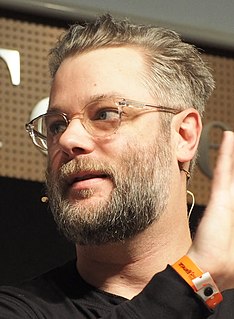A Quote by James Salter
My idea of writing is of unflinching and continual effort, somehow trying to find the right words until you reach a point where you can make no further progress and you either have something or you don't.
Related Quotes
What I'm really involved in when I'm writing is something that no one ever mentions when they see any play. Writing is like trying to make gunpowder out of chemicals. You have these words and sentences and the strange meanings and associations that are attached to the words and sentences, and you're somehow cooking these things all up so that they suddenly explode and have a powerful effect. That's what absorbs me from day to day in writing a play.
Write all the time. I believe in writing every day, at least a thousand words a day. We have a strange idea about writing: that it can be done, and done well, without a great deal of effort. Dancers practice every day, musicians practice every day, even when they are at the peak of their careers – especially then. Somehow, we don’t take writing as seriously. But writing – writing wonderfully – takes just as much dedication.
Sometimes, when actors reach out to their characters, they're nowhere in sight. They need to find something inside of them. And then the characters are right there. As a director, I want them to find the character that's already inside them, instead of trying to manufacture or manipulate or make something up. That's not really honest or true.
The best results are achieved by using the right amount of effort in the right place at the right time. And this right amount is usually less than we think we need. In other words, the less unnecessary effort you put into learning, the more successful you'll be... the key to faster learning is to use appropriate effort. Greater effort can exacerbate faulty patterns of action. Doing the wrong thing with more intensity rarely improves the situation. Learning something new often requires us to unlearn something old.
If you notice phrases, ideas, and anecdotes that closely resemble those that appear elsewhere in my writing, it's not a matter of sloppy editing. I'm repeating myself. I'm reshuffling words in the hope that just once I might say something exactly right. And I'm still wrestling with dilemmas that are not easily resolved or easily dismissed. I run at them again and again because I am not finished with them. Any may never be. Work-in- progress on a life-in-progress is what my writing is about. And some progress in the work is enough to keep it going on.
And so it was when anyone tried to speak: their minds would become tangled in remembrance. Words became floods of thought with no beginning or end, and would drown the speaker before he could reach the life raft of the point he was trying to make. It was impossible to remember what one meant, what, after all of the words, was intended.
Tell me what's wrong with this idea: If you're selling to somebody, find someone like that person to sell to them. If you're trying to reach swing voters, if you're trying to reach people on the fence, if you're trying to reach Republicans who are unsure about this candidate... get people who switched! Get people who are registered Republicans. Get people who were George Bush voters who can't bring themselves to do it again. Talk to them, get them to explain what their reasons are, and show them to people. What's wrong with this idea?!






































